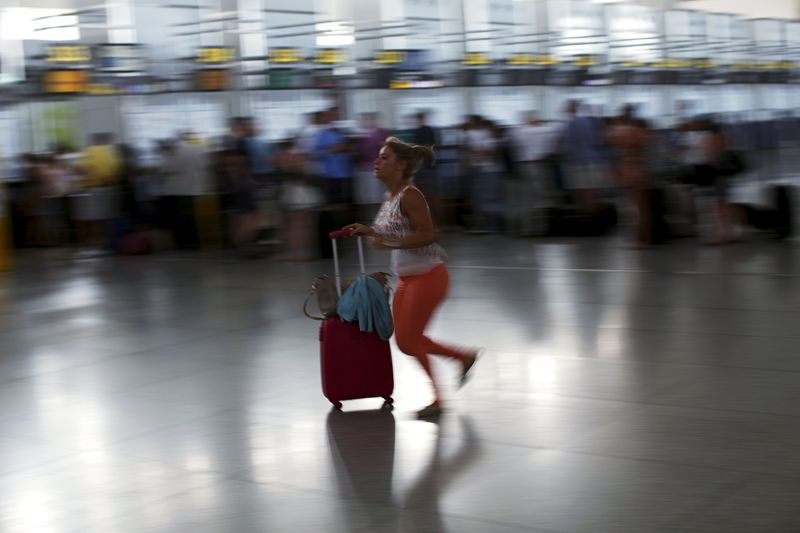By Kane Wu
HONG KONG, Aug 9 (Reuters) - HNA Group is preparing its bid for a concession to operate Belgrade's airport, a company executive said, undeterred by Beijing's sharpened scrutiny of overseas acquisitions, which has clouded some of the Chinese conglomerate's other pending deals.
HNA is leading a consortium that includes AVIC International Holding Corp and China-Central and Eastern Europe Investment Cooperation Fund for the 25-year concession to operate Nikola Tesla airport, the biggest in the Balkan region.
The next round of bids for the deal in Serbia are due in October, Wang Hexin, vice president of HNA Airport Group, said in an interview, as the group also announced the closure of an acquisition of an airport in Germany.
Serbia, which has an 83.1 percent stake in the Nikola Tesla airport, expects the concession deal to be worth around 400 million euros ($446 million), Reuters reported in June, when five preferred bidders were announced. on Wednesday closed its acquisition of an 82.5 percent stake in Germany's Hahn airport, which it bought for 15.1 million euros (17.8 million) from the federal state of Rhineland-Palatinate, the airport's local government owner.
In mid-July, HNA announced a $19 million deal to acquire a stake in Rio de Janeiro international airport from Odebrecht SA, the Brazilian conglomerate which has been hit by a corruption scandal. Wang said HNA could be investing another $300-$500 million for an expansion project of the airport.
"HNA is actively carrying out the country's Belt and Road initiative with overseas airports construction and investments," Wang said.
HNA Airport is a unit of HNA Modern Logistics, the Chinese conglomerate's logistics and industrial arm whose assets includes Swissport International, a Zurich-based air cargo handler that HNA acquired for $2.8 billion in 2015.
The airport deals come as China plans to further tighten the screws on overseas acquisitions by Chinese companies and borrowing to fund those transactions. However, the State Administration of Foreign Exchange said last week that domestic companies would still be encouraged to participate in Belt and Road activities.
The regulators stepped up pressure in June, which followed capital controls imposed by Beijing late last year. Chinese lenders were ordered to assess exposure to some of the more aggressive dealmakers, including HNA, the property-to-film conglomerate Dalian Wanda and Anbang Insurance Group.
Under pressure from regulators, Wanda last month announced a $9 billion property sale in China. On Tuesday, the group, however, denied media reports about it fielding offers to sell two real-estate projects in Australia.
"Wanda has never had any negotiations with any party," said John Wei, managing director of Wanda One Sydney, the group's Australian unit. "The construction of the two projects is moving forward smoothly, and apartment sales remain strong."
At least two of HNA's overseas deals have hit a hurdle as a result of the crackdown on transferring money outside China.
These deals are its announced acquisition of the London-based International Currency Exchange for about 200 million pounds ($264.36 million) and a mandatory tender offer to buy a larger stake in a Swedish hotel group. will prioritize investments that are in industries and regions mapped out under China's Belt and Road scheme, according to a person familiar with the company's thinking. The group is going through regulatory approval process for the announced deals and pushing them forward, the person said.
The airport deals are small compared to HNA's multi-billion dollar deals binge last year.
The privately-owned HNA entered into $50 billion of deals over the last two years, buying stakes in logistics firms, hotels and even Deutsche Bank DBKGn.DE .
The group's recent deals also included a $10 billion purchase of CIT Group's aircraft leasing arm, and a $6.5 billion deal for a 25 percent stake in Hilton Worldwide Holdings Inc.
HNA is in talks with offshore financial institutions for the investment in Rio airport and the Belgrade airport bid, Wang said.
HNA received over 70 million euros in subsidies for the Hahn airport deal, in which up to 25.3 million euros comes from the European Commission, Wang said.
The federal state of Rhineland-Palatinate provided the rest of the subsidies, he said.
